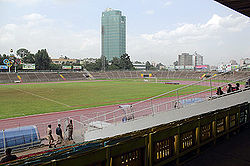| 1968 የአፍሪካ ዋንጫ | |
|---|---|
| Tournament details | |
| Host country | Ethiopia |
| Dates | 12–21 January |
| Teams | 8 |
| Venue(s) | 2 (in 2 host cities) |
| Final positions | |
| Champions | |
| Runners-up | |
| Third place | |
| Fourth place | |
| Tournament statistics | |
| Matches played | 16 |
| Goals scored | 52 (3.25 per match) |
| Attendance | 209,000 (13,063 per match) |
| Top scorer(s) | (6 goals) |
| Best player(s) | |
← 1965 1970 → | |
The 1968 African Cup of Nations was the sixth edition of the Africa Cup of Nations, the association football championship of Africa (CAF). It was hosted by Ethiopia. The field expanded to eight teams, split into two groups of four; the top two teams in each group advanced to the semifinals. Congo-Kinshasa won its first championship, beating Ghana in the final 1−0.
Contents
- Qualified teams
- Squads
- Venues
- Group stage
- Tiebreakers
- Group A
- Group B
- Knockout stage
- Semi-finals
- Third place match
- Final
- Goalscorers
- Team of the Tournament
- References
- External links
Prior to this tournament, the African Cup of Nations were held once every three years, following 1968 they were held once every two years.



